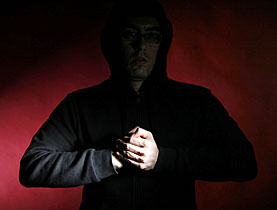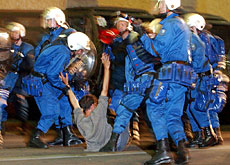Police demand tougher measures against violence

Violent attacks on the police have increased by 160 per cent since 2000 and the Police Officers Federation is calling for the criminal code to be changed.
The organisation, which represents 23,000 officers in Switzerland, has sent a petition to Justice Minister Eveline Widmer-Schlumpf, with three suggested measures for improving the protection of its members.
Only with political and judicial support can the increase in violence against police officers – whether at sporting events or political rallies – be curbed, it said.
“We are calling for a political discussion,” Max Hofmann, the federation’s general-secretary, told swissinfo.ch at the launch of the campaign in Bern on Tuesday.
“This petition doesn’t say we want this, this and that. We’re saying that we could imagine that these three points could be part of a discussion when looking for a solution.”
The first issue is the reintroduction of short-term prison sentences.
“[Currently in Switzerland] you don’t get sent to prison for less than six months or so. But we think these short periods of detention are very important because people will say to themselves ‘if I commit this crime, I will go to prison – I could lose my job’,” Hofmann said.
Second, the organisation called for the minimum penalty for attacking or threatening police officers to be clarified and raised. Finally, Hofmann said it could be “interesting” to use the French system of doubling the penalty for repeat offenders.
In 2008 there were 2,024 reported cases of violence against police officers – up from 774 in 2001, according to the Swiss Federal Police Office (Fedpol).
In the past two years, figures have continued to climb – by 14 per cent in 2007 and 18 per cent in 2008.
Lack of balance
Above all, anti-police violence connected to sporting events continued to rise steadily, said Heinz Buttauer, president of the Police Officers Federation.
He added that attacks on police officers were too often trivialised and reduced to minor offences as a result of a lack of legal consistency.
Hofmann cited the example of an officer who recognised a man responsible for a string of petrol station robberies and gave chase – only for the man to turn around and shoot at the police officer, “missing his head by centimetres”.
The man was caught, and the Zurich court sentenced him to four years of therapy – “although there was proof of robbery and intended murder”.
“Therapy is certainly good – I only say that therapy should be put together with imprisonment – you can’t shoot at a police officer and get four years’ therapy and that’s it!” Hofmann said.
“Another example: the people who were arrested in St Gallen for hooliganism last weekend were fined SFr800-1,300 ($775-1,260). And that’s it. But they behaved like terrorists. There was a policeman in Bern who slapped some young people during a riot and he was fined SFr300. I think the balance isn’t equal and should be improved.”
According to Buttauer, “an attack on the police force is an attack on the state” and should be condemned as such.
Social problem
Explaining the increase in violence against police is less black and white.
“That’s a difficult question,” Hofmann admitted. “I think it’s a social problem, not only a problem against police. But I think the police are like a target – in uniforms and cars – for all the people that have something against the government. So they say ‘OK, that’s the government, we’ll attack them’ – and that’s the problem we’re seeing now.”
He added that the type of violence had also changed. “Attacks against the police are now made with stones, knives and baseball bats and so on.”
Hofmann maintains, however, that in general police are popular.
“In Switzerland police officers have been one of the most popular groups [among the public] for many years. We also do very good public relations work to give people trust in police officers.”
And the next step? “We sent the petition to Justice Minister Widmer-Schlumpf on Friday and we hope that she will now give us an answer. Depending on that, we could maybe launch a people’s initiative.”
“One thing must not be forgotten in this debate,” Buttauer concluded. “Police officers are first and foremost human beings with families and children, worries and fears – and above all rights.”
Thomas Stephens, swissinfo.ch
Switzerland
Number of prisons: 115
Number of detention places: 6,654
Total prison population: 5,715
Proportion of female detainees: 5.5%
Proportion of foreign nationals: 69.7%
Source: Federal Statistics Office, 2007 data
Switzerland has been affected by football hooliganism since the start of the 1980s.
There have been serious incidents at regular intervals. Experts say football hooliganism now affects almost all teams in the top division and a series of less spectacular local incidents together add up. The problem has fragmented and clashes are difficult to predict and manage.
In June 2006 the Swiss Football League unveiled tougher measures against hooligans. Clubs are now more responsible for their fans when they play away games, meaning they have to organise the ticket sales for their sections of the away stadium themselves.
The guest club also has to take the personal details of their fans as well as provide somebody from the club to accompany the supporters and record violent incidents. An anti-violence campaign and mobile cameras, financed by the league, were also introduced.
These initiatives came on top of a raft of anti-hooligan measures approved by parliament in 2006 to crack down on violent fans ahead of the 2008 European Football Championship. They included a national hooligan database, travel restrictions for known troublemakers, stadia bans, obligation to attend police stations on match days and 24hr preventive custody.
These modifications, which were urgently introduced into federal internal security law, will become part of cantonal legislation from January 2010. So far 15 cantons out of 26 have ratified the changes.

In compliance with the JTI standards
More: SWI swissinfo.ch certified by the Journalism Trust Initiative












You can find an overview of ongoing debates with our journalists here . Please join us!
If you want to start a conversation about a topic raised in this article or want to report factual errors, email us at english@swissinfo.ch.